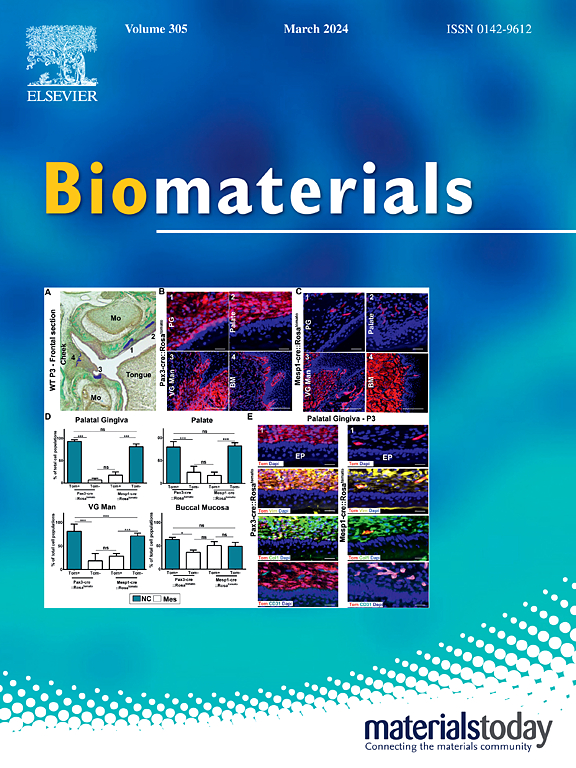利用血小板来源的细胞外囊泡靶向髓细胞克服免疫检查点阻断疗法的耐药性
IF 12.8
1区 医学
Q1 ENGINEERING, BIOMEDICAL
引用次数: 0
摘要
免疫检查点阻断(ICB)疗法旨在增强抗肿瘤免疫反应,但它可能无意中改变趋化因子谱,这可能会吸引抑制性骨髓细胞到肿瘤,导致获得性免疫抵抗。为了解决这个问题,我们开发了一个平台,使用血小板衍生的细胞外囊泡(PEVs)靶向icb治疗后的髓细胞。与自由给药不同,该系统通过CXCL-CXCR2轴选择性靶向抗pd - l1治疗的肿瘤,有效地重定向骨髓细胞并克服ICB耐药性。因此,小鼠对随后的ICB治疗周期表现出强烈的反应,从而显著提高肿瘤清除率和延长生存期。pev的靶向能力在接受化疗和放疗的肿瘤中也有效,表明其具有广泛的潜在应用前景。总之,pev为靶向免疫调节提供了一个通用平台,以抵消ICB治疗期间的获得性免疫抵抗。本文章由计算机程序翻译,如有差异,请以英文原文为准。
Targeting myeloid cells with platelet-derived extracellular vesicles to overcome resistance of immune checkpoint blockade therapy
Immune checkpoint blockade (ICB) therapy is designed to boost antitumor immune responses, yet it may unintentionally alter the chemokine profile, which can attract suppressive myeloid cells to the tumor, leading to acquired immune resistance. To address this, we developed a platform that targets myeloid cells post-ICB therapy using platelet-derived extracellular vesicles (PEVs). Unlike free drug administration, this system selectively targets anti-PD-L1-treated tumors through the CXCL-CXCR2 axis, effectively redirecting myeloid cells and overcoming ICB resistance. Consequently, mice exhibited robust responses to subsequent ICB therapy cycles, resulting in significantly enhanced tumor clearance and prolonged survival. The PEVs’ targeting capability was also effective in tumors treated with chemotherapy and radiotherapy, suggesting a wide range of potential applications. In summary, PEVs offer a versatile platform for targeted immunomodulation to counteract acquired immune resistance during ICB therapy.
求助全文
通过发布文献求助,成功后即可免费获取论文全文。
去求助
来源期刊

Biomaterials
工程技术-材料科学:生物材料
CiteScore
26.00
自引率
2.90%
发文量
565
审稿时长
46 days
期刊介绍:
Biomaterials is an international journal covering the science and clinical application of biomaterials. A biomaterial is now defined as a substance that has been engineered to take a form which, alone or as part of a complex system, is used to direct, by control of interactions with components of living systems, the course of any therapeutic or diagnostic procedure. It is the aim of the journal to provide a peer-reviewed forum for the publication of original papers and authoritative review and opinion papers dealing with the most important issues facing the use of biomaterials in clinical practice. The scope of the journal covers the wide range of physical, biological and chemical sciences that underpin the design of biomaterials and the clinical disciplines in which they are used. These sciences include polymer synthesis and characterization, drug and gene vector design, the biology of the host response, immunology and toxicology and self assembly at the nanoscale. Clinical applications include the therapies of medical technology and regenerative medicine in all clinical disciplines, and diagnostic systems that reply on innovative contrast and sensing agents. The journal is relevant to areas such as cancer diagnosis and therapy, implantable devices, drug delivery systems, gene vectors, bionanotechnology and tissue engineering.
 求助内容:
求助内容: 应助结果提醒方式:
应助结果提醒方式:


